FUTO Forestry Students In FUTA For Practical Training
Federal University of Technology, Owerri (FUTO) Department of Forestry and Wildlife Technology students in Federal University of Technology Akure( FUTA) for practical trainings.
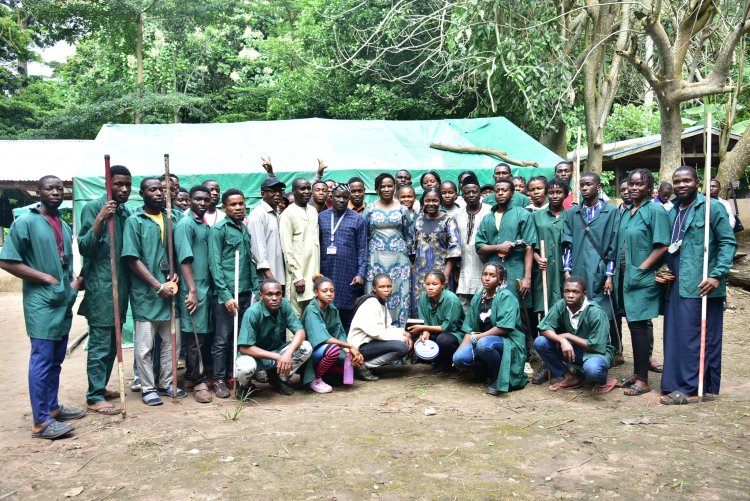
Federal University of Technology, Owerri (FUTO) Department of Forestry and Wildlife Technology students in Federal University of Technology Akure (FUTA) for practical trainings.
Forty-seven 400 level students from the Department of Forestry and Wildlife Technology of the Federal University of Technology, Owerri , FUTO are in the Federal University of Technology Akure , FUTA for a one month intensive training in cutting edge forest assessment techniques and associated configurations.
The lead Trainer, Professor Shadrack Akindele of the Department of Forestry and Wood Technology, said the one month stint in FUTA is forest assessment training for students studying forestry and a key component of forestry programme in all training institutions. He added that to manage the forest sustainably, one needs to take stock of what is in the forest.
He said the training entails taking the students inside the forest with modern instruments and demonstrating how to make measurement on the trees and how to do calculation with those measurements to know the volume of trees in the forest and plan accordingly.
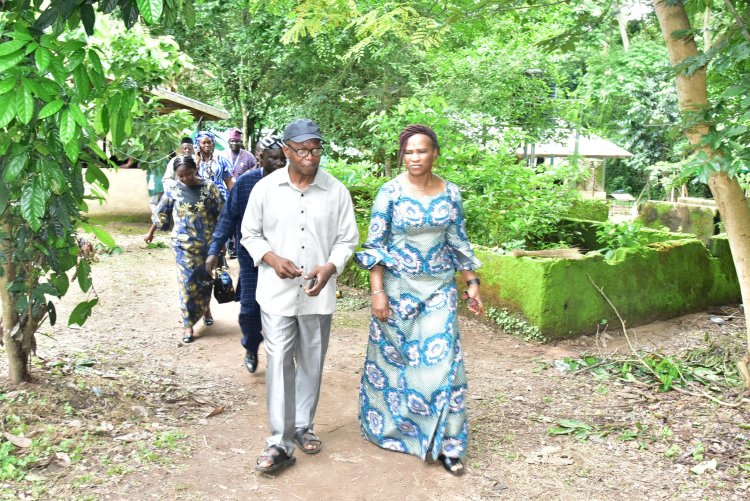
On the choice of FUTA as annual destination for the training by students from FUTO, Federal University of Agriculture Abeokuta and other institutions, Professor Akindele said it is because of the resource and expertise available at FUTA. He said, “FUTA has become a destination of choice for the training because most of our colleagues in other institutions recognize where the expertise in different disciplines are and they send students to those areas where there are specialists for knowledge acquisition. When it comes to forest assessment they come to FUTA.”
Two of the students, Ugwu Queeneth and Ezinwa Moses expressed their delight in the training describing it as impactful. They said, “We have been impacted in no small measure since we came. We have been through different practical aspects related to our field of study. FUTA is a great institution endowed with huge human and material resources. We are grateful to our trainer and father, Professor Akindele and his team who have been very friendly and accommodating. It is a great experience.”
The Vice Chancellor ,Professor Adenike Oladiji, who paid a visit to the students , commended FUTA’s Department of Forestry and Wood Technology (FWT) for leading in the training of students of Wood Technology from sister institutions. She said knowledge sharing and liberalization are key to developing individuals, institutions and nations.
She said FUTA’s FWT is not just a department that teaches theory, but goes the extra mile to teach knowledge enhancing skills that will make students globally relevant in the future. She added that there are enormous resources available in the Forest if properly harnessed to generate revenue, citing FUTA’s example with 1,200 palm trees through which the university produces palm oil for local consumption which confirms further the institutions uniqueness as a practical oriented university.
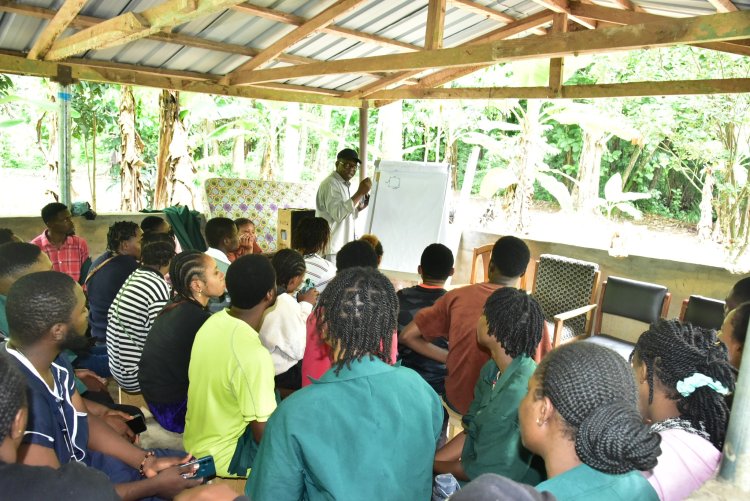
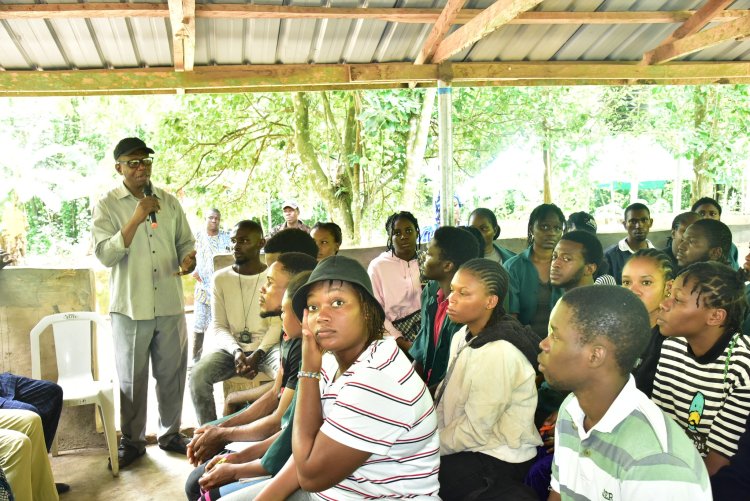
She admonished the trainee to take the training seriously so that they can go back to their base as better students and also upon graduation to positively affect the world. She said, “Part of the challenges you should take home from here is not just site seeing, but also to get back to Owerri now and when you graduate, and do something such that this training can make your department to showcase you and your skills.”
She also urged them to deliberately and personally see to how they can use their initiative with or without the input of their department or the university, to impact the society. “Some of these initiative can come from you. It may require some push, some consultations and knowledge exchange through heads of relevant departments. We are looking towards making our FWT a hub for our industry development because we know industries can spring out of FUTA. I believe we should no longer keep the potential we have to ourselves. We have to showcase what we are doing to the world,” she added.
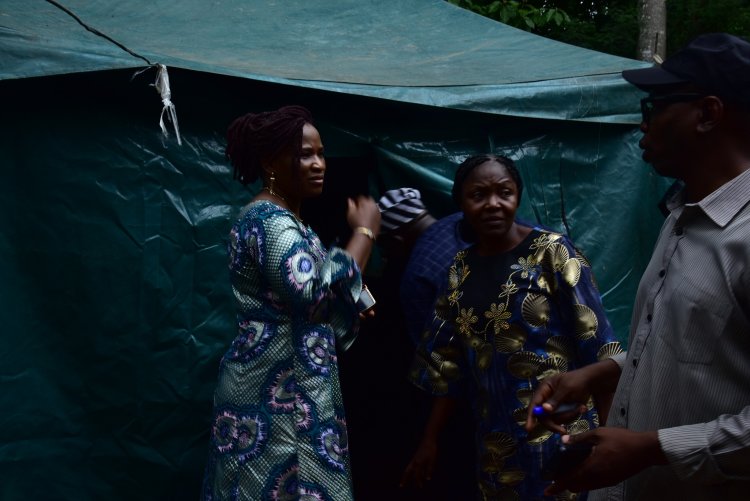
Admonishing the students further, she encouraged them to look beyond imminent obstacles, but take the stride because there will always be obstacles, but they are not insurmountable. “Even if it is sowing the seed of the idea, let others water it. We hope that the knowledge imparted here will go a long way to sharpen our orientation for life. I believe we have industrialists, captains of industries, entrepreneurs among you. So let this visit ignite the fire in you and we want to hear more of your success stories,” she said.
She commended the lead trainer, Professor Shadrack Akindele for always standing in the gap and taking it upon himself to train youth and students in forestry and wood related endeavor for the future. She lauded the effort of the Head of FWT department, Professor Adesoji Adedayo too for his effort and urged him to ensure the collaboration between the department and the visiting students is sustained through relationship building.
Professor Akindele in a closing remark bemoaned the rate of deforestation in Nigeria estimated to be at the rate of 2.8–3% of the forest land per year. He said there is no virgin forest around again because almost all forests have been logged and logged over. He attributes deforestation to the activities of illegal fellers who go at night to cut trees. He urged the government to involve the communities where these forests are located in the management of the forests because where such is in place success is imminent. He confirmed that in some communities, vigilantes’ groups are in place to police the forest with the promise that revenue accruing from such forests will be shared at a determined ratio.
MySchoolNews reporting.

 Emelie
Emelie 



